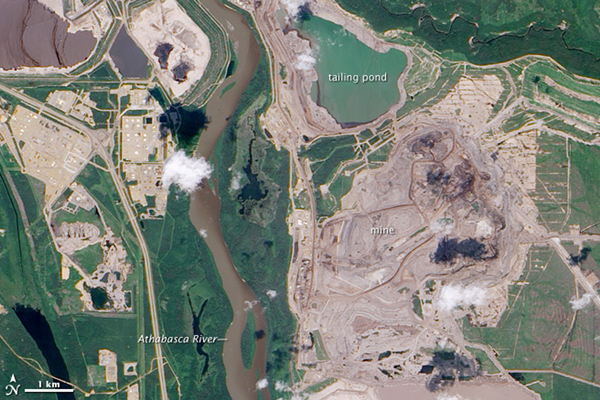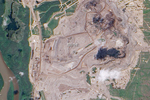Efforts to expand production from the Alberta tar sands suffered a significant setback on Friday when the provincial government of British Columbia rejected a pipeline project because of environmental shortcomings.
In a strongly worded statement, the government of the province said it was not satisfied with the pipeline company’s oil spill response plans.
The rejection of the pipeline—which was to have given Alberta an outlet to Pacific coast ports and markets in China—further raises the stakes on another controversial tar sands pipeline, Keystone XL.
Barack Obama is still weighing a decision on that pipeline, intended to pump tar sands crude to the Texas gulf coast.
British Columbia, in its official submission to a pipeline review panel, said the company had failed to demonstrate an adequate clean-up plan for the Enbridge Northern Gateway project. It set five new conditions for the project’s approval.
“Northern Gateway has presented little evidence about how it will respond in the event of a spill,” Christopher Jones, a lawyer representing the province, said in a statement to the federal government panel reviewing the project.
“It is not clear from the evidence that Northern Gateway will in fact be able to respond effectively to spills either from the pipeline itself, or from tankers transporting diluted bitumen,” Jones added.
Jones said the pipeline would cross over remote and extremely difficult terrain, with pristine rivers that could be devastated in the event of a spill. He said those considerations compelled the province to hold the pipeline company to a higher standard. “Trust me is not good enough in this case.”
Officials in British Columbia said Friday’s decision would not necessarily kill off the project for good. But the demand for more stringent protections poses additional challenges to Enbridge’s plans of building the pipeline.
The Canadian government has lobbied extensively in support of both projects and to prevent restricts on exports from the tar sands. In recent months, the government of Stephen Harper has deployed teams of lobbyists, and dispatched cabinet officials to US and European cities to make the case for tar sands development.
Prices for tar sands crude have been dropping in the absence of a reliable export route.
The Enbridge project, though not as ambitious as Keystone XL had been an important part of Harper’s contingent plan. Canadian government officials had argued that if Obama turned down Keystone XL, Canada would simply ship crude to China.
As currently envisaged, the $6bn (£4bn) Northern Gateway project would extend about 700 miles from the Alberta tar sands to a tanker port on the northern coast of British Columbia. It would have the capacity to ship more than 525,000 barrels of oil per day.

Partial view of Canada’s tar sands from satellite in 2009. Photo by: NASA.
Original Post: Tar sands supporters suffer setback as British Columbia rejects pipeline
Related articles
Canadian government drops over $16 million on advertising its tar sands

(05/16/2013) The Canadian government has nearly doubled its advertising spending to promote the Alberta tar sands in an aggressive new lobbying push ahead of Thursday’s visit to New York by the prime minister, Stephen Harper. The Harper government has increased its advertising spending on the Alberta tar sands to $16.5m from $9m a year ago.
Citizen group finds 30 toxic chemicals in air following tar sands oil spill in Arkansas

(04/30/2013) Independent air samples by locals have yielded “a soup of toxic chemicals” in Mayflower, Arkansas where an Exxon Mobil pipeline burst on March 29th spilling some 5,000 barrels of tar sands oil, known as bitumen. Chemicals detected included several linked to cancer, reproductive problems, and neurological impacts such as benzene and ethylbenzene. Air samples were taken by community leader and University of Central Arkansas student April Lane a day after the spill. However, the Environment Protection Agency (EPA)’s and Exxon Mobil’s air samples have yielded chemical levels below harm except in the direct clean-up area, according to the Arkansas Department of Health (ADH).
Tar sands oil spill: ruptured pipe pours 200,000 gallons of oil into suburban neighborhood (photos)

(04/04/2013) Last Saturday, an oil pipeline carrying tar sands oil from Canada ruptured in Mayflower, Arkansas spilling between 3,500-5,000 barrels of crude (at most 210,000 gallons) into neighborhood streets and lawns. Families from 22 homes have been evacuated while clean-up crews have scrambled to contain the spill. ExxonMobil, which runs the 65-year-old Pegasus pipeline, has stated it will pay for any damage, however critics say the oil spill is more evidence that the Obama Administration should turn down the Keystone XL tar sands pipeline.
Over 35,000 march on Washington demanding climate action and rejection of Canada’s ‘carbon bomb’

(02/18/2013) Yesterday over 35,000 people rallied in Washington D.C. for urgent action on climate change, which, according to organizers, was the largest climate march in U.S. history. Activists called on the Obama Administration to do much more to tackle climate change, including rejecting the Keystone XL Pipeline, which would bring carbon-heavy tar sands oil from Canada through the U.S. to a world market.